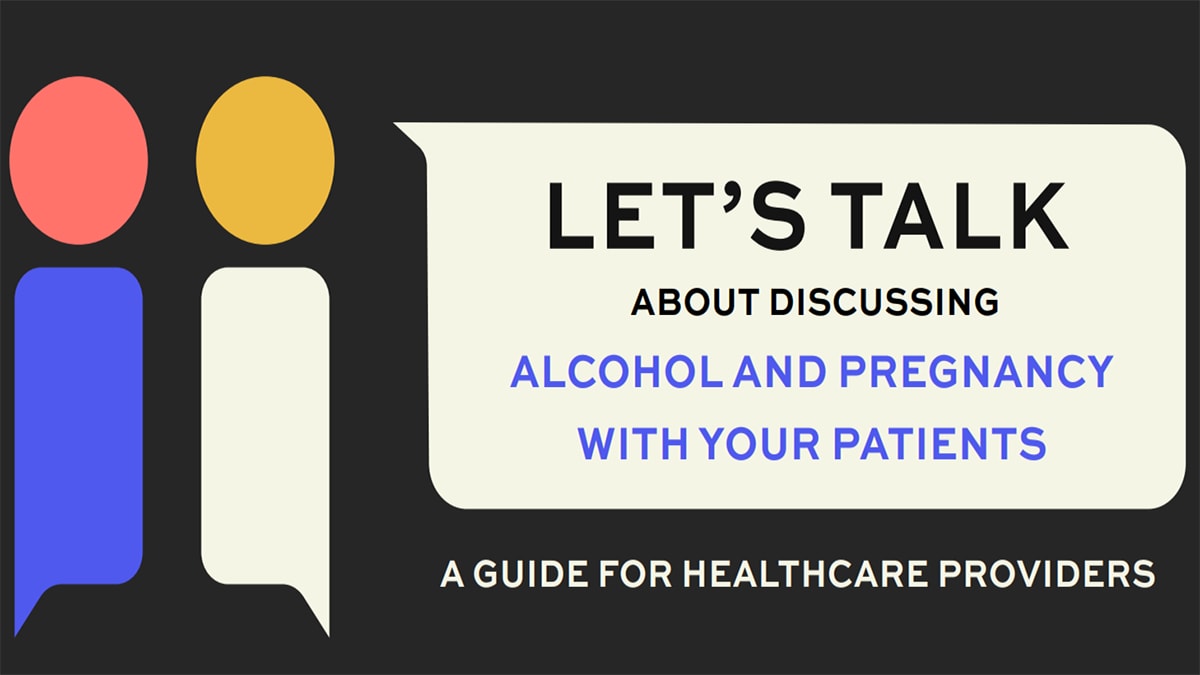Key points
- These tools and resources can help educate healthcare professionals about alcohol use during pregnancy.
- Resources includes free online courses, information to facilitate patient-provider communication, and other materials.

Educational offerings
These courses are free and allow learners to save their progress—thus offering the flexibility to take the training as schedules permit.
For courses related to fetal alcohol spectrum disorders (FASDs), visit FASDs: Online Trainings and Resources.
This online training course describes 10 steps for implementing alcohol screening and brief intervention in clinical practice.
This online training course describes the importance of interprofessional collaborative practice in health care and how to implement this approach to prevent alcohol-exposed pregnancies.
These brief videos provide additional information and are designed to complement the online CDC courses. The videos do not provide continuing education credits.
For supplemental learnings related to FASDs, visit FASDs: Online Trainings and Resources.
Following this activity, you will be able to answer some common questions about alcohol use and pregnancy.
After watching this video, the learner will be able to identify elements of a motivational interviewing-based, non-judgmental conversation to address alcohol use.
Following this activity, you will understand the limits and levels of what is considered excessive drinking.
Medscape CDC Expert Commentary: 5 Things to Know About Alcohol Use During and After Pregnancy
The commentary highlights data related to alcohol use during and after pregnancy and alcohol SBI. It also includes resources for clinicians to help facilitate discussing alcohol use during pregnancy with patients and implementing and conducting alcohol SBI.
Podcast—Alcohol and Pregnancy: The More You Know
Two seasons of the podcast are available. Each season offers free continuing education credits (CME, CNE) through Boston University Chobanian & Avedisian School of Medicine. Episodes include interviews with experts in the field, people with lived experience, and patient advocates, and demonstrations of having difficult conversations with patients.
Tools
CDC and its partners have resources to help prevent alcohol and other substance use during pregnancy and to help provide care for children with FASDs and their families.
The American Academy of Family Physicians (AAFP) provides resources to help physicians recognize and address excessive alcohol use. Resources include an alcohol and other substance use practice manual, a CME activity—Addressing Prenatal Alcohol and Other Substance Use, training and resources related to alcohol and other substance use during pregnancy, and information on reimbursement and coding for screening and intervention.
The University of Nevada, Reno, in collaboration with the American Association of Medical Assistants (AAMA), has developed resources to help maximize the limited time medical assistants have with patients during appointments. This includes a series of Walk & Talk products for medical assistants to provide important reminders about alcohol and other substance use.
The University of Alaska Anchorage collaborates with the Association of Women's Health, Obstetric and Neonatal Nurses (AWHONN) and the National Association of Nurse Practitioners in Women's Health (NPWH). Together, they work to increase knowledge and skills among advanced practice nurses and midwives about the health impact of excessive alcohol use, including any alcohol use during pregnancy. A series of "I am a champion because..." videos feature nurses explaining why they are FASD champions and how others can get involved. A modular curriculum is available to support women's health nurse practitioners and midwifery education faculty to incorporate FASD-related content into their courses. This collaboration also features short videos on a variety of topics related to FASDs, alcohol screening and brief intervention, and preventing alcohol use during pregnancy.
The American College of Obstetricians and Gynecologists (ACOG) has developed an FASD prevention program that provides physicians with resources and tools to communicate with patients about alcohol use during pregnancy. Fetal Alcohol Spectrum Disorders: Ethical and Legal Perspectives is a free, online learning module. It helps healthcare professionals consider legal issues and ethical principles used in FASD prevention efforts. The eModule offers continuing medical education and maintenance of certification credits. The program also includes tools and videos to help providers address alcohol use during pregnancy and provide alcohol-related resources specific to each ACOG district or section.
The American Academy of Pediatrics (AAP) has developed a comprehensive, web-based FASD toolkit. The toolkit has resources for pediatricians to raise awareness, promote developmental surveillance and screening, and ensure that all children living with FASDs and their families receive appropriate and timely care. This comprehensive toolkit serves as a framework for the management of a child with an FASD in the medical home (a term that describes patient-centered, team-based health care led by a healthcare provider). The toolkit includes information on identification, diagnosis, referral, patient management resources, practice management tools, frequently asked questions for providers and families, and resources for in-depth training.
Additionally, AAP offers resources to help pediatricians and other healthcare providers incorporate screening, brief intervention, and referral to treatment into their practices to reduce, delay, prevent, or stop adolescent substance use.
The University of Texas at Austin has partnered with the National Association of Social Workers (NASW) and the NASW Foundation to reach social workers at both national and state levels in the prevention of alcohol and other substance use during pregnancy and FASDs. Resources include a series of blogs to help social workers understand their role in making alcohol screening and brief intervention part of routine care.
Clinical decision support tool
In 2019, CDC funded the MITRE Corporation to develop five publicly available, standards-based clinical decision support (CDS) tools that follow evidence-based guidelines for alcohol SBI. These CDS tools can be integrated into electronic health record (EHR) systems and other health information technology to support adoption of this preventive service, inform clinical decisions, and improve healthcare delivery. The MITRE Corporation collaborated with AllianceChicago to pilot two of the CDS tools in a real-world setting. The pilot helped identify possible enhancements and inform future CDS implementation. The Pilot Final Report describing this work can be accessed via the following web pages: World Health Organization Alcohol Use Disorders Identification Test CDS and Alcohol Brief Intervention and Referral CDS.

